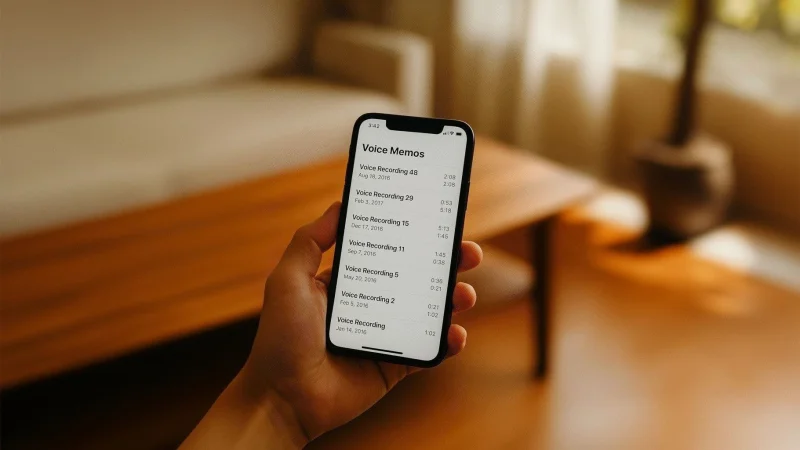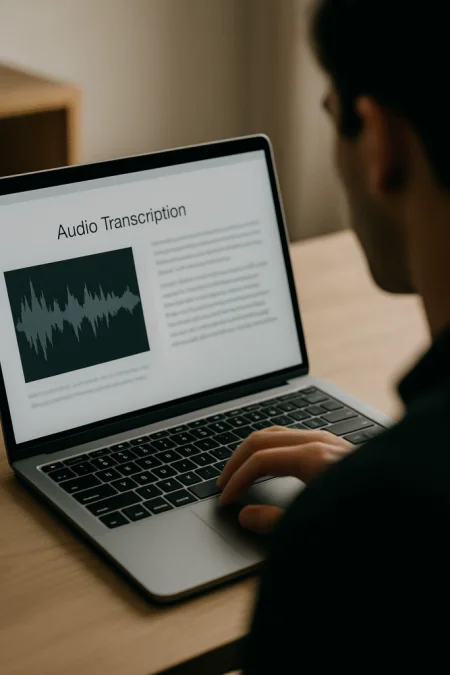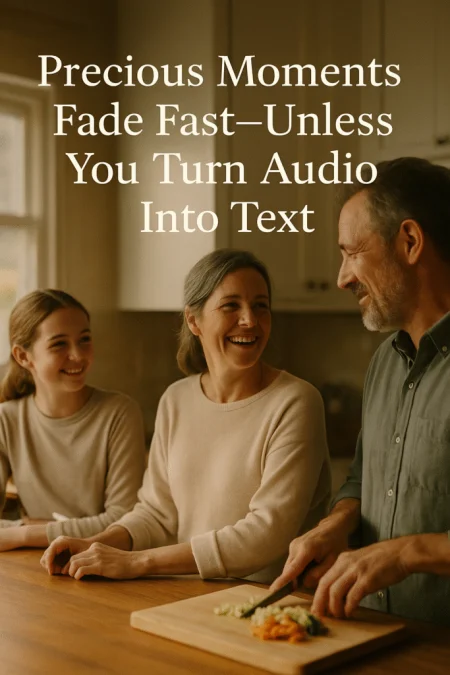Precious Moments Fade Fast—Unless You Turn Audio Into Text
There are moments in life that don’t seem important as they happen—the sound of someone making dinner, a child testing out a new word, a quick voice message from a parent. They feel ordinary, forgettable even. But years later, one of those small recordings can unexpectedly stop you in your tracks.
That happened to me recently when I found a five-year-old audio clip buried in my phone.
It was my dad in the kitchen, humming while he chopped vegetables.
Nothing dramatic. No sentimentality.
But hearing it again—after so many years—felt strangely emotional. The tone of his voice, the cadence of the knife, the small offhand comments he made to himself… all of it resurfaced memories I didn’t realize I had misplaced.

And it reminded me of something we often overlook:
the memories we assume will remain forever are usually the first ones to fade.
We capture countless moments in audio—intentionally or not—but most of them end up hidden in long lists of unnamed files. It made me rethink not only how I save memories, but how I ensure they actually stay accessible in the future.
We Record More Than Ever, Yet Remember Less
With phones making it effortless to record audio, our devices are filled with voice notes, reminders, and fragments of daily life.
A quick idea you didn’t want to type, a message from a sibling, a funny moment from a toddler, a bit of background noise on a family trip.
But audio is one of the least practical formats for memory.
1. Audio hides meaning inside a timeline
There’s no preview. No summary.
You either press play and listen, or the file stays untouched.
2. It demands more time than most people are willing to give
You can skim text or glance at photos. Audio requires minutes you don’t always have.
3. File names strip away context
“Recording 48” could contain something important—or nothing at all.
Eventually, many people turn to audio to text transcription to help preserve the value of these recordings before they’re buried for good.
Tools like SoundWise.ai make this easier by converting audio to text directly in the browser, so you can see the meaning without replaying the full recording.
Why Turning Audio Into Text Helps You Hold Onto What Matters

After rediscovering my dad’s kitchen recording, I tried converting it into text. I didn’t expect much, but the effect was surprising.
Text makes a moment easier to revisit
You can understand a memory in seconds rather than listening through the entire file.
Text is easier to organize and search
Words can be highlighted, categorized, and found again with ease.
Text gives shape to a memory that was previously hard to grasp
Seeing something written down adds clarity that audio alone doesn’t provide.
Audio carries emotion.
Text adds structure.
Together, they form a more complete way of remembering.
While sorting through my older recordings, I noticed how many of them were MP3 files from trips, birthdays, and everyday moments I had forgotten. Converting a few through simple mp3 to text tools allowed me to quickly understand what each file contained without listening to every minute.
According to SoundWise.ai’s website, it supports a wide range of audio and video formats—including MP3, WAV, M4A, MP4 and more—so most old files convert easily.
Which Recordings Are Worth Keeping?
Not every audio file needs to be transcribed.
But some categories almost always carry significance once you revisit them.
1. The everyday sounds of family
Small exchanges and casual conversations often become the most meaningful memories later on.
2. Children learning to express themselves
Their voices and vocabulary change quickly. Text helps preserve these fleeting phases.
3. Your own voice notes from different life stages
Old recordings reveal what mattered to you at the time—what you worried about, hoped for, or didn’t notice you were feeling.
As I reviewed my files, I realized how easily these moments could have disappeared into digital clutter if I hadn’t paused to look at them more intentionally.
Transcription helps you instantly recognize which recordings are meaningful instead of letting them blend into endless filenames.

How Transcription Changed the Way I Remember
The conversion process is simple, but the shift in how you experience memories can be significant.
It helps you reconstruct the scene
Seeing the words brought back not just my dad’s voice but the whole atmosphere of that evening.
It turns forgotten recordings into understandable stories
A few lines of text have a way of revealing the heart of a moment.
It makes sharing memories easier
A short excerpt is easier to send to family than a long file hidden deep in your phone.
According to SoundWise.ai, the transcription happens directly in your browser without uploading files, which makes converting family memories feel safer and more private.
In a way, transcription turns your phone from a storage device into a time capsule you can actually open.
Voice and Text Work Better Together Than Alone
Voice holds tone and warmth.
Text provides clarity and longevity.
Each fills in what the other lacks.
Audio helps you feel a moment.
Text helps you keep it.
And in a world where we save more data than ever but rarely revisit it, combining the two can be a meaningful way to make sure the most important pieces of your life don’t get lost along the way.
If you scroll through your recordings today, you’ll probably find moments you forgot you even captured. Some might be trivial. Others might be the kind of memories you’re glad you still have the chance to hold onto.
Precious moments fade quickly.
But they don’t have to disappear.
If you want an easy way to turn voice memories into text, SoundWise.ai is a simple place to start.
Ti potrebbe interessare:
Segui guruhitech su:
- Google News: bit.ly/gurugooglenews
- Telegram: t.me/guruhitech
- X (Twitter): x.com/guruhitech1
- Bluesky: bsky.app/profile/guruhitech.bsky.social
- GETTR: gettr.com/user/guruhitech
- Rumble: rumble.com/user/guruhitech
- VKontakte: vk.com/guruhitech
- MeWe: mewe.com/i/guruhitech
- Skype: live:.cid.d4cf3836b772da8a
- WhatsApp: bit.ly/whatsappguruhitech
Esprimi il tuo parere!
Che ne pensi di questa notizia? Lascia un commento nell’apposita sezione che trovi più in basso e se ti va, iscriviti alla newsletter.
Per qualsiasi domanda, informazione o assistenza nel mondo della tecnologia, puoi inviare una email all’indirizzo [email protected].
Scopri di più da GuruHiTech
Abbonati per ricevere gli ultimi articoli inviati alla tua e-mail.
